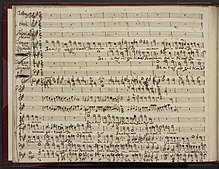Psalm 112
The 112th psalm is a biblical psalm from the fifth book of the psalter . It can be characterized as a wisdom psalm and its content is related to Psalm 1 and especially Psalm 111 , with which it shares the alphabetical arrangement of lines in the Hebrew original .
Remarks
The statement made in Psalm 111 : 3 Lu about God's glory and splendor and his righteousness is related to the pious ( God-fearing ) in the third verse of this Psalm . These should also have "wealth and abundance" and in their house "righteousness should remain forever". Justice does not only mean obeying the commandments of God , but also includes the blessing with which this is rewarded by God.
The individual lines of verse in the original text follow the Hebrew alphabet (so-called acrostic ). Similar forms of poetry can be found in a number of other psalms ( Psalm 9 and 10 , 25 , 34 , 37 , 111 , 119 and 145 ) or in sections from other books of the Bible ( Proverbs 31: 10–31 Lu or the first four chapters of the Lamentations of Jeremiah ).
According to the Greek number of the Septuagint , which is also used by the Latin Vulgate , the psalm bears the number 111.
reception
The Vesperae solennes de Dominica ( KV 321) by Wolfgang Amadeus Mozart from 1779 is set to music, including Psalm 112.
By Antonio Salieri , the setting is Beatus vir, qui timet Dominum in D major for two tenors, four-part choir and orchestra survived.
Web links
- Psalm 112 in the standard translation , the Luther Bible and other translations from bibleserver.com
- Psalm 112 in the Biblia Hebraica Stuttgartensia (BHS) on bibelwissenschaft.de
- Sheet music in the public domain for settings of Psalm 112 in the Choral Public Domain Library - ChoralWiki (English)
Individual evidence
- ↑ Stuttgart Explanatory Bible. 2nd Edition. German Bible Society , Stuttgart 1992, ISBN 3-438-01121-2 , p. 752

